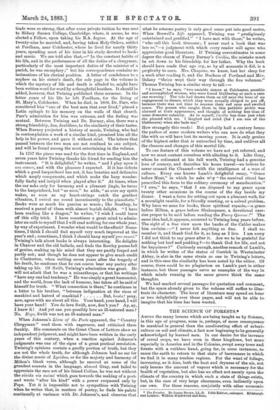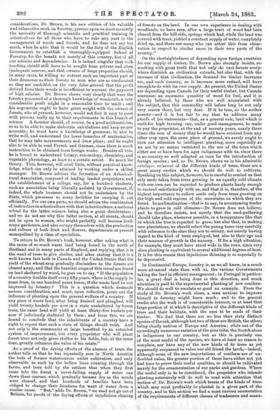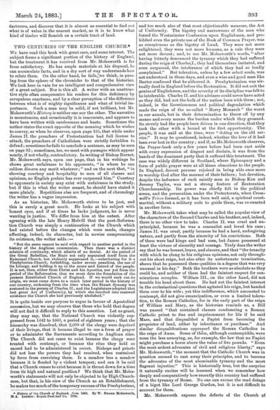THE SCIENCE OF FORESTS.* AMONG the many lessons which are
being taught us by Science,. in this age of progress, none is, perhaps, of more consequence to mankind in general than the ameliorating effect of arbori- culture on soil and climate, a fact now beginning to be generally, acknowledged by learned men. In our desire for the increase of cereal crops, we have even in these kingdoms, but more especially in America and in the Colonies, swept away trees and forests with a ruthless hand, going far, in some instances, to cause the earth to return to that state of barrenness in which we find it in many treeless regions. For the want of foliage,. increasing, as it does, both the heat and dryness of the air, not only lessens the amount of vapour which is necessary for the health of vegetation, but also has an effect not merely upon the climate of the country in which such a state of things exists, but, in the case of very large clearances, even indirectly upon our own. For these reasons, conjointly with other economic
• The Forester. By James Brown, LL.D. Fifth Edition, enlarged. Edinburgh and London: William Blackwood and Bone.
'considerations, Dr. Brown, in his new edition of his valuable and exhaustive work on forestry, presses upon us most earnestly 'the necessity of thorough scientific and practical training in arboriculture for all those who have to take any part in the management of woods and forests, and he does not say too much, when he adds that it would be the duty of the English Government to establish a thoroughly-equipped School of Forestry, for the benefit not merely of this country, but of all our colonies and dependencies. It is indeed singular that such teaching should still have to be sought from private and often 'inadequate sources, and that owners of large properties should, in many cases, be willing to entrust such an important part of their demesnes as their forests to men who are as uneducated as they are unskilful, on the very false ground that the profit derived from their woods is insufficient to warrant the payment -of high salaries. Dr. Brown shows very clearly that were the forester possessed of a thorough knowledge of woodcraft, a very -considerable profit might in a reasonable time be made ; and • his arguments ought to have great weight with the owners of forests, who at present, however, would not find it easy to meet with persons really up to their requirements in this branch of science. A forester should, of course, be a good arithmetician, so as to be able to make elaborate calculations and keep proper accounts ; he must have a knowledge of grammar, be able to write well, and understand the lower branches of mathematics, that he may take measurements and draw plans ; and he ought also to be able to read. French and German, since there is much instruction to be obtained from foreign works. Besides all this, he is bound to understand botany, entomology, chemistry, and (vegetable physiology, at least to a certain extent. So much for theory. This, however, will avail little, without practical know- ledge, which can only be attained by working under a skilled manager. Dr. Brown advises the formation of an Arboricul- tarsi Association, composed of leading landed proprietors, and the establishment of a college, say, for a hundred students, -such an association being liberally assisted by Government, if, indeed, the whole business should not be undertaken by the State, which possesses so many facilities for carrying it out -efficiently. For our own parts, we should advise the combination of instructionin arboriculture with that inhorticulture, a national school for the latter science being also a great desideratum ; and we do not see why this latter section, at all events, should not be open to women, who might perfectly well become land- scape gardeners, and also occupy themselves with the production -and culture of both fruit and flowers, departments at present monopolised by a class of specialists.
To return to Dr. Brown's book, however, after asking what is the cause of so much waste land being found in the north of Scotland and in many parts of England, and replying that it is the want of trees to give shelter, and after stating that it is a well-known fact both in Canada and the United States that the yield of the wheat-crop gradually diminishes as the forests are -cleared away, and that the heaviest crops of this cereal are found on land sheltered by wood, he goes on to say," If the population of a country doubles itself every fifty years, where is the supply to come from, in one hundred years hence, if the waste land be not improved by forestry P This is a question which demands -serious consideration, and must, upon reflection, point out the influence of planting upon the general welfare of a country. If any piece of waste land, after being drained and ploughed, will yield twenty bushels per acre in a state unsheltered by forest trees, the same land will yield at least thirty-five bushels per -acre if judiciously sheltered by them ; and from this, we are bound to conclude that the inhabitants of a country have a right to expect that such a state of things should exist. And not only is the community at large benefited by an extended system of improvement, but every proprietor who will plant forest trees not only gives shelter to his fields, but, at the same time, greatly enhances the value of his estate."
As a proof of the drying effects of the absence of trees, the author tells us that he has repeatedly seen in North America the beds of former watercourses under cultivation, and only observable as such by the hollow lines running through the farms, and been told by the settlers that when they first came into the forest a never-failing supply of water ran -down these courses, which gradually became dry as the woods were cleared, and that hundreds of families have been -obliged to change their locations for want of water from a similar cause. "But," adds Dr. Brown, " we need not go out of Britain, for proofs of the drying effects of injudicious clearing of forests on the land. In our own experience in dealing with woodlands, we have seen, after a large tract of wood had been cleared from the hill-side, springs which had, while the land was covered with trees, yielded a constant supply of water, completely dried up, and there are many who can attest this from obser- vation in respect to similar cases in their own parts of the country."
On the shortsightedness of depending upon foreign countries for our supply of timber, Dr. Brown also strongly insists, re- marking with great truth that not only do vast forests every- where diminish as civilisation extends, but also that, with the increase of that civilisation, the demand for timber increases too, and each country, as it becomes more refined, will have enough to do with its own supply. At present, the United States are depending upon Canada for their useful timber, but Canada consumes an enormous quantity of wood for fuel, and it is already believed, by those who are well acquainted with the subject, that this commodity will before long be not only very scarce there, but very dear. If it be true, as the author asserts—and it is but fair to say that he adduces many proofs of his statements—that, as a general rule, land which is unfit for high farming can, under good management, be made to pay the proprietor, at the end of seventy years, nearly three times the sum of money that he would have received from any other crop upon the same piece of ground, we surely ought to turn our attention to intelligent planting, more especially as we are by no means restricted to the use of the trees which either are or have been for ages indigenous with us, since there is no country so well adapted as ours for the introduction of foreign species ; and, as Dr. Brown shows us in his admirable catalogue raisonuti of the different kinds of trees, there are a great many exotics which we should do well to cultivate. Speaking on this subject, however, he is careful to remind us that only seeds taken from trees growing in an equally cold climate with our own can be expected to produce plants hardy enough to succeed satisfactorily with us, and that it is, therefore, of the highest importance to collect seeds only from trees growing on the high and cold regions of the mountains on which they are found. In acclimatisation—that is to say, in accustoming tender plants to grow in cold climates—Dr. Brown does not believe; and he therefore insists, not merely that the seed-gathering should take place, whenever possible, in a temperature like that in which the tree is expected to grow, but also that, in making new plantations, we should select the young trees very carefully with reference to the sites they are to occupy, not merely having regard to the kind of trees employed, but also to their age and their manner of growth in the nursery. If for a high situation, for example, they must have stood wide in the rows, since very close planting is equivalent to several additional degrees of heat. It is for this reason that injudicious thinning is so especially to be deprecated.
In Continental Europe, forestry is, as we all know, in a much more advanced state than with us, the various Governments taking the lead in efficient management ; in Portugal in particu- lar, a great deal is being done in this direction, and much attention is paid to the experimental planting "cif new coniferas. We should do well to emulate so good an example. From the study of Dr. Brown's work alone, a man anxious to improve himself in forestry might learn much ; and to the general reader also the work is of considerable interest, or at least that large portion of it which is descriptive of the different kinds of trees and their habitats, with the uses to be made of their timber. We find that there are no less than sixty distinct species of the oak, although but two of these are British, the others being chiefly natives of Europe and America; while out of the exceedingly numerous varieties of the pine tribe, the Scotch alone is indigenous to our country, but as this is precisely one of the most useful of the species, we have at least no reason to complain, nor have any of the new kinds of fir trees as yet apparently surpassed in value our old friend the larch,—indeed, although some of the new importations of coniferas are of un- doubted value, the greater portion of them have either not yet had time to prove their useful qualities, or should be cultivated merely for the ornamentation of our parks and gardens. Where the useful only is to be considered, the proprietor who intends planting extensively will do well to read with attention that section of Dr. Brown's work which treats of the kinds of trees which may most profitably be planted in a given part of the country, and in this section we find a most curious enumeration of the requirements of different classes of tradesmen and mann-
facturers, and discover that it is almost as essential to find out what is of value in the nearest market, as it is to know what kind of timber will flourish on a certain tract of land.




































 Previous page
Previous page